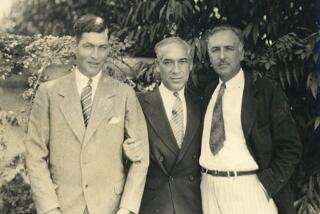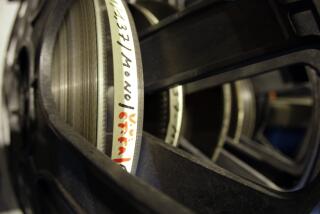Classic Hollywood: Trailblazer Ida Lupino, a woman for her time — and ours
Born Feb. 4, 1918, Ida Lupino would have been a good fit for 2018. Describing herself as “the poor man’s Bette Davis,” the actress turned down roles she didn’t want and spent the subsequent suspensions on the studio lot observing and learning the craft of filmmaking.
Lupino was groomed for stardom in her native England, coming from a family with a 200-year legacy in the theater. She landed in Hollywood as a teenager and made her mark in films such as “Anything Goes,” “The Light That Failed,” “They Drive By Night” and “High Sierra.”
In her early 30s, Lupino walked away from stardom and lucrative acting contracts to write and direct socially conscious B-movies starring unknowns. Later, she successfully moved into television, directing dozens of episodes of series ranging from “77 Sunset Strip” and “Have Gun — Will Travel” to “The Twilight Zone,” “Bewitched” and “Gilligan’s Island,” all while working as a character actress for hire.
Throughout her almost 50-year career, Lupino was a frequent presence in The Times. Bold and often irreverent, she broke through the well-oiled studio publicity machine to speak her truth, even contradicting herself over the years. Below are a few of her most memorable quotes.
-------------
At 17, Lupino presented as a confident straight-talker who already chafed at the limitations of the studio system.
“My father, Stanley Lupino, started training me for grown-up roles when I was 7. He kicked me out to make my own way when I was 12 and I have supported myself, and my mother, too.”
“I know my job. They have a stock company on the [Paramount] lot and were putting on ‘Double Door.’ We were to choose our parts, but they had me slated for the ingenue. The ingenue! I chose the old woman of 70. I studied old women for days before rehearsal and believe me I gave them some performance. Sir Guy Standing said I was wonderful. Charles Vidor took notes, so whoever does the part in the picture will use my ‘business.’”
“I knew I could never play a naive 12-year-old — you cannot play naive if you’re not. I never had any childhood.”
“I always have to feel my role, so I make a point of having a crush on every actor I have love scenes with. Of course, when the picture is over, the crush is too.”
“Oh, I’m not swell-headed. We actors know what we can do. I know I still have a lot to learn. But I cannot tolerate fools, won’t have anything to do with them. I only want to associate with brilliant people …” (1934)
-------------
------------
During Lupino’s tumultuous stint at Warner Bros. in the 1940s, playing second fiddle to Bette Davis and serving those fortuitous suspensions, she amused herself through reinvention.
“Now they think of me whenever any real, sweet heroine is needed. Eight months ago that would have seemed impossible.”
“They advised me to come up out of the muck and be my own simple self. So I did. If, in a year or so, I go back to being a witch, people will be surprised and delighted and my employers will proudly announce the arrival of a ‘new’ Lupino.” (1944)
-------------
The next year, she was playing the role of a good soldier, even speaking of a long-term contract that would not be. She would leave Warners in 1947.
“It is all somewhat complicated, but I have pretty well resolved one thing, and this is that it is best to cast your fate with one studio under an exclusive contract, because they have your interest at heart. They purchase stories with you in mind.”
“I can’t, of course, forgo my commitments at 20th [Century Fox], but if I sign a deal with Warners it will probably be be for five years, and on an exclusive basis apart from the 20th agreement, with two pictures assured annually, and possibly one more if there is time, or if I am not called on to fulfill my commitment with the other organization.”
“No matter what anyone may say, acting those parts [intense roles] takes a great deal out of a person who is of a nervous temperament and I must confess that, I was troubled in that way. I never could return home to eat dinner with any satisfaction. I was restless and couldn’t sleep. It was all too much of a strain.”
“Now, I would feel able to undertake that type of part again on the screen. In fact, I want to do such a character. [Writer-producer] Jerry Wald has a very interesting story called “One Man’s Secret,” which would give a wonderful opportunity. That and ‘Escape Me Never,’ which once starred Ingrid Bergman, are subjects that I’d like to do.
“The woman in “One Man’s Secret” [made in 1947 as “Possessed” with Joan Crawford and Van Heflin] is a real villainess and her villainy partakes of insanity at times. So you see I’m setting a real test and task for myself in choosing such a picture.” (1945)
-------------
After the making the leap and directing the 1949 independent film “Not Wanted,” Lupino and her then-husband, producer Collier Young, started a production company and planned to focus on stories, not stars.
Lupino often appeared in the columns of her friend Hedda Hopper (the two acted together in the 1937 Jack Benny musical comedy “Artists & Models”). She told Hopper, “I feel that it’s about time the screen got rid of some of the old faces, including mine. I intend to give up acting altogether eventually and devote my time to other facets of picture making.”
“I’ve never really liked acting,” she continued. “It’s a torturous profession and plays havoc with your private life.”
“Now, I want to do what was never done for me. We’re planning to tailor our stories to fit the kids that play in them [Lupino was 31 at the time]. I want to write for them, direct for them and help with their wardrobe.” (1949)
-------------
In 1951, she still hadn’t given up acting, but had developed strong opinions on directing, including why she preferred not to do screen tests or direct herself.
“I am quite satisfied to confine myself to directing, story conferences and some writing. One cannot do too many things well.”
“This talk about being photogenic is rubbish. You do not need to put a person in front of the camera to tell whether he or she has film acting ability or fitness for pictures. The makeup men have to have something to do, too, and the same goes for the cameraman. We know without a camera test when we’ve got an interesting personality and talent.
“Like any other player in pictures I need someone to watch me. I wouldn’t want to take a chance on even a single scene without such supervision.”
-------------
By the 1960s, Lupino was working primarily in television (but still acting).
“I find being a director very helpful when I’m acting. I’m much more understanding of the director’s problems — I try to give him as little trouble as possible and just do as I’m told.”
“Only once in awhile does something really exciting come along in the acting end. But when you’re directing something like ‘Thriller’ [a 1960-62 television anthology hosted by Boris Karloff; Lupino directed nine episodes], there’s a marvelous variety.” (1961)
-------------
In 1966, Lupino penned a guest column for the vacationing Hopper.
Recalling Warner Bros. offering her a seven-year contract after “They Drive by Night” (1940), she wrote, “I said I’d have to think it over. All I could think of was that seven years from that day I’d be a movie star, but they’d be saying the same thing to another girl; that in seven years she’d be another Ida Lupino. I decided there was something more for me in life other than being a big star. So I said no and walked out.”
By that point Lupino had directed 67 television series and was working on her ninth (and final) feature, “The Trouble With Angels,” starring Rosalind Russell. (1966)
-------------
“People have the impression now that I don’t want to act, but it isn’t so. It’s difficult to work out a schedule in TV when you’re directing, because you usually sign to do four or five segments and they’re not always in succession. They wanted me twice this year for Dr. Kildare, but I was busy directing.” (1966)
-------------
Lupino’s last directing credit was in 1968 for the Hope Lange-Edward Mulhare series “The Ghost and Mrs. Muir,” she last appeared on TV in a 1977 episode of “Charlie’s Angels,” and her final film as an actress was “My Boys Are Good Boys” the following year. Lupino died in 1995.
SIGN UP for the free Classic Hollywood newsletter »
Movie Trailers
More to Read
Only good movies
Get the Indie Focus newsletter, Mark Olsen's weekly guide to the world of cinema.
You may occasionally receive promotional content from the Los Angeles Times.







